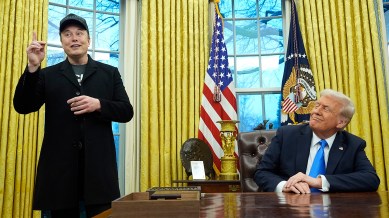Stay updated with the latest - Click here to follow us on Instagram
Trump, Musk overhaul US bureaucracy: Nearly 10,000 federal workers laid off as govt downsizing accelerates
With tens of thousands of federal workers already out of work and more layoffs looming, the future remains uncertain for many government employees.

Donald Trump Federal Layoffs: In a sweeping move to reduce the size of the federal government, President Donald Trump and adviser Elon Musk have escalated their campaign to downsize US agencies, with more than 9,500 workers terminated across key departments including Interior, Energy, Veterans Affairs, and Health and Human Services (HHS). The layoffs, which began Friday, have raised alarm among unions, state officials, and workers, many of whom are challenging the legality of Musk’s unprecedented role in reshaping federal institutions.
Targeting agencies and reducing bureaucracy
The latest wave of firings follows Trump’s long-standing pledge to reduce what he sees as a bloated federal bureaucracy, contributing to the nation’s $36 trillion debt and last year’s $1.8 trillion deficit. While the cuts have primarily affected probationary employees within their first year of service—who have fewer legal protections—they reflect a broader strategy to downsize government. This marks a continuation of Trump and Musk’s plan, which has already resulted in approximately 75,000 federal workers accepting buyouts as part of a voluntary separation initiative. In total, the reductions account for nearly 3% of the federal civilian workforce.
monthly limit of free stories.
with an Express account.
Unions and workers respond to layoffs
Unions and workers were quick to respond to the sudden terminations. Steve Lenkart, executive director of the National Federation of Federal Employees, which represents over 100,000 federal workers, voiced concerns that Musk’s involvement represents a push to deregulate industries and remove government oversight in key sectors.
“This is really about getting government out of the way of industry and incredibly wealthy individuals, which is why Musk is so enthusiastic about it,” Lenkart said.
Nick Gioia, a veteran and former Department of Defence employee who recently joined the US Department of Agriculture’s Economic Research Service, expressed his shock after being fired. “As a veteran, I feel like I’ve been betrayed by my country,” he said. “This feels like a game, with little regard for the real lives being affected.”
Civil-service protections under attack
Musk’s campaign, dubbed the Department of Government Efficiency (DOGE), is seeking to undermine traditional civil-service protections, causing concern among legal experts and federal workers alike. As part of the broader cuts, the administration is freezing US foreign aid, slashing budgets, and attempting to close down agencies such as the Consumer Financial Protection Bureau (CFPB) and the US Agency for International Development (USAID). Reports indicate that nearly half of the probationary workers at the Centers for Disease Control and Prevention (CDC) and National Institutes of Health (NIH) have already lost their jobs, with more cuts likely to follow.
Additionally, the US Forest Service has announced plans to dismiss around 3,400 recent hires, while the National Park Service is laying off about 1,000 employees. Other agencies, including the Internal Revenue Service (IRS), are also bracing for significant layoffs as the April 15 tax deadline approaches, further straining federal resources.
Legal challenges and Judge’s rulings
The Trump administration’s aggressive approach to downsizing has not gone without opposition. Unions have filed lawsuits to block parts of Musk’s buyout plan, arguing that the strategy violates established labour protections. Several federal judges are now considering the legality of Musk’s unprecedented access to government systems and sensitive data across multiple agencies. On Friday, a federal judge in New York extended a temporary restraining order preventing DOGE from accessing Treasury Department payment systems, marking a temporary reprieve for some workers.
Meanwhile, attempts to fire employees in key national security sectors have encountered pushback. For example, the Department of Energy (DOE) laid off between 1,200 and 2,000 employees, including 325 from the National Nuclear Security Administration (NNSA), which oversees the nation’s nuclear arsenal. However, some of these layoffs were partially rescinded due to concerns over retaining essential personnel to maintain the nuclear stockpile’s safety.
Musk’s role sparks controversy
The controversial involvement of Musk, a billionaire with substantial business interests in US government contracts, has drawn scrutiny. Critics argue that his approach, relying on a team of young engineers with little experience in public administration, is ideologically driven rather than aimed at improving efficiency or reducing costs. Treasury Secretary Scott Bessent dismissed these concerns, likening Musk’s efforts to a financial audit that seeks out inefficiencies and best practices in government operations.
“These are serious people conducting a serious audit of government agencies,” Bessent said during an interview on Fox Business Network. However, many observers are concerned that the cuts are more about dismantling regulatory oversight than improving governance.
Uncertain future for US workers
With tens of thousands of federal workers already out of work and more layoffs looming, the future remains uncertain for many government employees. While the administration argues that reducing the federal workforce is necessary to address the nation’s fiscal challenges, critics worry that the cuts are being executed without sufficient consideration for the impact on critical services and the livelihoods of thousands of Americans.
As the campaign to shrink the government unfolds, the Trump administration’s reliance on Musk’s expertise — coupled with ongoing legal challenges — signals a tumultuous period ahead for both federal workers and the agencies they serve.